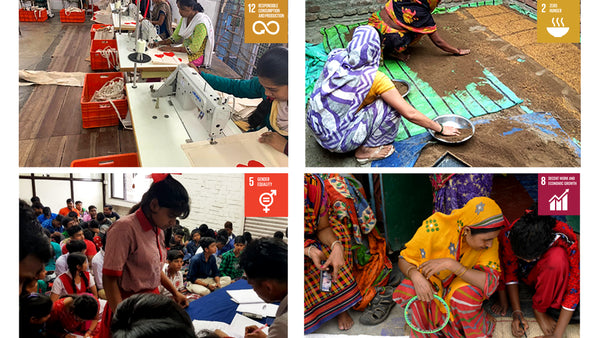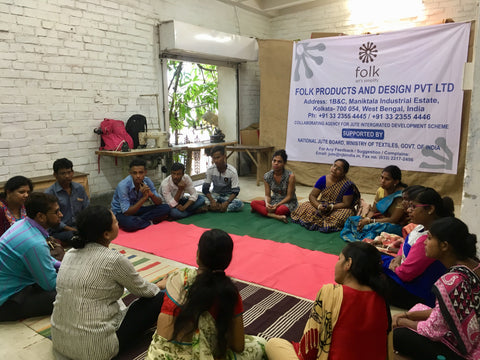
Realisations are a funny thing – they tend to happen when you least expect it.
The Coronavirus lockdown was a rough time for everyone, that goes without saying. But somehow most of us managed to pull through knowing that our jobs were secure, that we had some savings which would keep us afloat, and that we had alternatives if something fell through. It wasn’t easy, but we made it.
But what of the people who had none of these things. The people who lived a hand-to-mouth existence, had no savings and only a single means of occupation to rely upon. How would they bring food to their tables and ensure a dignified survival? For Folk, the penny dropped and we were shocked out of our lockdown-lull when we were flooded with desperate calls from our weavers and artisans pleading for some work – any work – so that their families wouldn’t have to starve or resort to begging. But the market was closed, demands were low, and we didn’t have much work to offer.


That’s when we knew – it was time to be bold and think big. However, before we moved forward it was important that we looked back to understand what hasn’t worked for so long. After extensive surveys and deliberation, we found that although our country is very rich in handicrafts, the resulting products have become irrelevant in our modern lives as they no longer meet the necessary functional requirements or the contemporary aesthetic tastes. Furthermore, these products are erratic in terms of production and are often severely lacking in quality to be able to compete with their mainstream industrial counterparts.
The few products that happen to be bought are mostly done out of sympathy rather than genuine need and hence, there is no consistent demand creation. Moreover, value chain inconsistency along with excessive dependency on natural resources makes the supply unpredictable. Upon further enquiry, we also came to know that the demand for their products or services was seasonal and so, they had no employment for several months of the year.
With this knowledge under our belts, there was no time to waste. And so, we started working on a new project – Design for Dignity. A dream project to generate 1,00,000 consistent, dignified, and sustainable livelihoods for rural weavers, artisans, and other skilled or unskilled youth of India through a series of Comprehensive Skill Training Programs.
Now, government skill training programs have been around for years, but they don’t seem to be very effective as is clear from the increasing poverty and decreasing employment rates. And while Folk had conducted a few successful small-scale training programs previously, we knew that to achieve our audacious goal of generating 1,00,000 livelihoods we needed to adopt a unique modus operandi. So, we went back to the drawing board to identify and rectify what has been lacking in these programs so far.


From a dearth of quality training partners to the arbitrary creation of Self-Help Groups; from no Demand Mapping of the market to inflexibility of the training curriculum; from an absence of mentoring and career graphing of trainees to a lack of soft-skills training – the problems were glaringly obvious to us.
So, to address these gaps, Folk aspires to lay the framework of a new paradigm of livelihood creation through skill training which would encompass both Hard and Soft skills thus imparting a holistic guidance which would make the participants job-ready as per the current and future market trends. The plan is to customise the training program in accordance with the ground reality of the participants so that it can work as a practical solution to their manifold problems.
Here’s an example. Rural Indian women are faced with the responsibility of single-handedly fulfilling all domestic chores like raising the children, cooking, cleaning, collecting water, et cetera. This takes up a major portion of their day and so, they can only work for a few hours (4-5 hour shifts in rotation) at a stretch. Thus, they need to be equipped with a multi-faceted skillset that allows them to earn a living but also, does not impede their ability to manage the household.

Our approach will be novel as we will endow all trainees with varied skillsets to overcome their own limitations as well as the changes in market trends. This will help ensure sustainable employment for the program participants throughout the year. Therefore, the thrust of the program will be to create a market-aligned curricula which would include agricultural as well as non-agricultural activities - think organic farming, handloom weaving, backyard gardening, food processing, labelling and packaging, cutting and tailoring, quality control, hospice training - to provide diverse options for the participants to choose from as per their interests and convenience.
It was a unanimous decision to formulate a Skill Training program which would meet the needs of all – those with no skills whatsoever, as well as those who have some expertise in a particular field but have not been able to realise its potential. For those with no latent skills, we would start with the fundamentals and then delve into the intricacies, thus building their capabilities from the ground up. As for those who possess certain pre-existing skills and talents, we would upskill them by teaching how to hone their craft, reorient them to the needs and demands of the modern consumer thereby making their product or service marketable.
After completion of the training, we shall help the participants acquire job placements through our reliable connections in every industry. We shall also provide the necessary aid to set up micro-enterprises to participants with entrepreneurial aspirations.
But why do we call it “Design for Dignity”?
This is because Folk has come up with this unique strategy of creating dignified and sustainable job opportunities by re-imagining and applying the tenets of Design Thinking to reverse-engineer the whole process. Through the iterative process of Design Thinking, we seek to challenge assumptions and redefine these problems so that we can deduce alternative strategies and solutions which shall, in turn, facilitate an empathetic understanding of the persisting problems.

Our plan is to study and secure the market first, then directly engage with the craftspeople and use their craftsmanship to develop novel products that are user-centric, high on functionality, suit modern day lifestyles, and then impart the skill training as per market demand.
Our goal is ambitious, the stakes are high, and the journey is uncertain – but we are committed to our mission of creating 1,00,000 sustainable livelihoods. And we firmly believe that with our unwavering sincerity, innovative ideas, and determination to empower the rural folk in becoming self-reliant through gainful employment – nothing is impossible.

